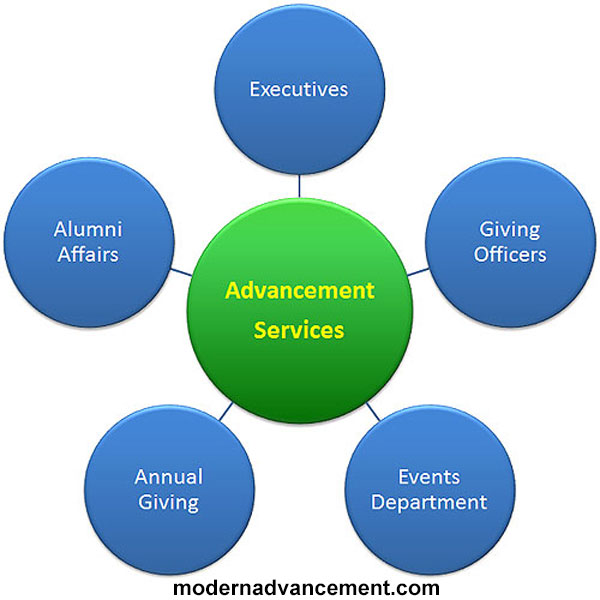If you’ve ever worked in any nonprofit or fundraising organization of a certain size you’ve probably encountered a department called “Advancement Services” or “Institutional Operations.” And while you might know what the “Human Resources” or “Information Management” departments do within an organization, there is often a little bit of a mystery around the vague name and nebulous job responsibilities of the Advancement Services department. So what, exactly, is Advancement Services?
The uncertainty surrounding the Advancement Services profession is likely a result a several different factors.
First, the field of Advancement Services is still a relatively new profession. The first true Advancement Services department was created in 1987 by John Taylor at Duke University.
Second, it is a field that is only found in fundraising and non-profit organizations and it’s evolving at fast pace due to its close ties to rapidly changing advances in technology. While the responsibilities between any two Advancement Services departments may be different, there are some common roles which unite Advancement Services professionals together.
Advancement Services Definition
I usually describe the role of Advancement Services this way:
Advancement Services is the department that’s responsible for entering, storing, maintaining, and retrieving most of the data related to a fundraising organization’s supporters, donations and internal operations.
That broad definition usually gets a lot of nodding heads but not much more. I then add this more relaxed description:
We are, essentially, the fundraising and computer database people.
And that’s when people outside of the world of fundraising begin to understand what Advancement Services does.
How Advancement Services Fits into an Organization
A fundraising organization or department will often have many “front line” staff members including giving experts, development officers, executive leaders, public relations people and even event planners. But all those gifts, all those supporters and all the information surrounding the activities of the fundraising staff needs to be collected and managed by someone. That’s where Advancement Services comes in.
The Association of Advancement Services Professionals (AASP) describes Advancement Services as “the backbone of an organization’s Advancement operation.” That’s a good analogy but not a great one. I like to think of it more as the “hub in the center of a nonprofit’s organizational wheel.”
Like this:

Almost every department that is directly involved with fundraising in a non-profit organization spends time meeting and greeting with new people in public or private. These fundraisers are advancing a particular mission or trying to raise funds through events or solicitations. By contrast most Advancement Services departments work “behind the scenes” to indirectly support (and sometimes coordinate) all the fundraising activities being performed.
As the name implies, people in Advancement Services often work to serve the other members of Advancement with the information or resources they need to raise money.
Advancement Services Responsibilities
- Maintain Personal and Company Data: Enter and maintain biographical and personal records of constituents, donors, alumni, prospects, and other supporters. Also maintains any information pertaining to other businesses and organizations which provide financial or other types of support.
- Record Charitable Gifts: Process gifts according to non-profit standards and manage grants, planned gifts and non-cash gifts.
- Create Fundraising Reports: Create and disseminate financial, organizational, and constituent reports for internal and external audiences.
- Analyze Data: Provide context and create a deeper understanding of data kept, including building prospect ratings and scores, predicting income and combining data from multiple sources to increase likelihood of soliciting the correct audience.
- Provide Research: Research and find new prospects and identify new information pertaining to existing prospects.
- Send Acknowledgements: Assist in the production of external communications including gift receipts, donor recognition publications, pledge reminders and solicitation pieces.
- Archive Institutional Data: Manage personal and financial archives of the organization.
- Educate Others: Train other staff members how to use and interpret reports and stored data.
The Council for Support and Advancement of Education (CASE) lists these approximate responsibilities as major areas of interest for most Advancement Services professionals. While Advancement Services departments are not unique to educational nonprofits, they are often found in colleges and universities of almost every size and type.
Technology’s Role in Advancement Services
As nonprofit organizations have evolved and the entire field of professional fundraising has matured it has become essential to maintain large amounts of data. Advancement Services as a field is intimately tied to technology because both have grown out of these data handling needs. Just as for profit companies use computers to track sales and customers, modern fundraising organizations turn to computers and digital tools to streamline their processes and store their data.
With more data comes more complexity. More sophisticated technological tools are designed to handle the complexity and which often makes it easier to collect more data. It is a cycle which many of us are familiar with.
Because the Advancement Services department is so closely tied to electronic databases and software to use them, the field often attracts more “technically inclined” individuals who enjoy working with computers. As a result the Advancement Services staff often falls into the unofficial role of helping other staff members use and master the technology available to them. In some organizations the link to technology is more formal and it is the Advancement Services department that works with other technical areas and software vendors almost exclusively.
Advancement Services In Summary
A modern fundraising organization needs an Advancement Services department to process gifts, maintain constituent data, and create analytical reports which help inform future decisions. While the responsibilities of an Advancement Services department can be accomplished by various other departments within an organization, there are plenty of efficiencies that can be gained by combining them all into one area. Tracking gifts, receipting donors, creating financial reports and maintaining constituent records are related internal office activities that are best accomplished by a professional staff that is dedicated to helping a fundraising organization meet its objectives.